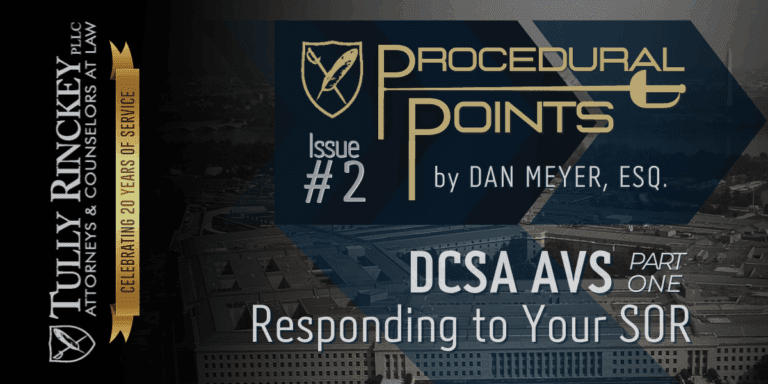In December 2024, the outgoing Biden Administration ended five years of jurisdictional infighting within the Defense Department’s security review process by limiting the jurisdiction of the Defense Office of Hearings and Appeals (DOHA). There are indications this grant of increased jurisdiction to the Defense Counterintelligence and Security Agency (DCSA) will now be adjusted—again—but you need to keep the DOHA and DCSA procedures distinct. They are different processes. This article deals primarily with the now elevated role of DCSA and its new Adjudication Vetting & Services division (AVS). DOHA still facilitates security review procedure for industrial personnel, or contractors. Thus, what follows will be most useful for Federal employees and military members.
Does Receiving an LOI and SOR from DCSA Mean You Have Lost Your Security Clearance?
No. Receiving a Letter of Intent (LOI) to Revoke Eligibility for Access to Classified Information and/or Assignment to Duties that have been Designated National Security Sensitive —the dreaded “Statement of Reasons”, or “SOR”, from Security—does not mean your security clearance has been denied or taken away.
There are 72 or so Federal adjudication systems. Although they all fall under SEAD-4 (issued by the Director of National Intelligence in her collateral duty as Security Executive Assistant to the President for Personnel Security throughout the Executive branch), SEAD-4 is only a baseline. Security Offices can add to requirements as needed to meet mission. In the Defense Department, this means the proposed denial or revocation attached to an SOR is “preliminary.” This decision from DCSA AVS is not final. With a strong and contrite response—backed with evidence and not rhetorical fluff—you can continue to work in the classified workspace and remain within the circle of trust.
Numbers are hard to come by, and are often heavily contextualized. Approximately, four million people hold security clearances. Approximately 2.8 million individuals have Secret clearances, 1.2 million hold Top Secret clearances, and the rest have Confidential clearances. Public trust positions, although not classified, also require background checks. This adds to these numbers, under a lesser process known as “Suitability” review. Almost all of these people are under continuous evaluation (CE).
If CE triggers heightened review, a person enters adjudication. About 300,000 people are under heightened review at any one time. Most retain their clearances. Those that do retain their clearances were smart and did not go like sheep to the slaughter. Nor did they decide to be the lone wolf. Lone wolves are erratic and unpredictable. Most get shot in the snow and die a cold death.
What Happens After Receiving an LOI and SOR from DCSA?
Your security clearance has not been denied or revoked. But in the meantime, the impact on your job could still be grave. It is up to your organization’s Security Management Office (SMO) to determine whether or not to suspend your access to classified information, or assign you to non-sensitive duties until a final determination is made.
What happens is pretty simple: even though your local commander or administrator (through the Security Office) controls access, the local authorities usually follow DCSA AVS recommendations. You may stay on the job. More likely, you will be suspended—with or without pay—until the security review is complete. This means you need to plan for a protracted period without pay. This catches many Federal employees by surprise.
It is also the responsibility of your organization’s SMO to make sure you receive your LOI and SOR, understand your options, and help you to prepare and forward the required forms to DCSA AVS. It is your responsibility to meet your deadlines. Beyond exigent circumstances beyond your control, like deployment status, you will not be granted an extension.
You can contact us 24 hours a day, 7 days a week via phone at 8885294543, by e-mail at info@tullylegal.com or by clicking the button below:
How to Respond to an LOI and SOR
Once you receive notice that DCSA intends to revoke your clearance, you must respond. The Statement of Reasons Receipt and Statement of Intent form provided offers three basic options for your initial response. You may choose one:
- Respond in writing only with no personal appearance;
- Respond in writing and make a personal appearance, or
- Not respond, and allow the decision to me made on the record.
Be mindful that the security review process comes with a number of deadlines. Missing a deadline—except in very particular circumstances beyond your control—is taken as no response. Meaning, if you miss the deadline to notify DCSA AVS of your intent to respond to the SOR, DCSA AVS will assume you have chosen not to respond to the SOR. They will then make a final decision using only the information already available to them: the information that resulted in your security review in the first place.
Deadlines You Must Not Miss
You have several key deadlines to track. These can vary, but the clock always starts the day you receive your SOR. For instance, DoD employees have 10 days to respond to DCSA AVS, whereas industrial personnel have 20 days to notify DOHA of their intent to respond.
Statement of Reasons Receipt and Statement of Intent – 10 Days
You have 10 days to respond to the SOR, starting from the day you received notice. This is a statement of intent to respond, not your response proper. You are simply informing DCSA AVS of whether you intend to defend yourself, and by what means (written response only, or written response with personal appearance). Your SMO will forward your completed form receipt—Statement of Reasons Receipt and Statement of Intent—to DCSA AVS. This first deadline is not for your substantive response, so do not panic as many do.
Written Response – 30 Days
You have 30 days to submit your written response: your actual defense. Again, the clock starts once you receive the SOR. It is up to your organization to grant you an extension if requested (usually 30 days at most). Any further extensions require DCSA approval. These are not given lightly, but it is always good to have your attorney ask.
Key Preparations to Start ASAP
Ideally, you would have begun laying the groundwork of your defense well before receiving an SOR. There is much to be done, and not much time to do it in.
Request Your Pertinent Documents
Begin the process of requesting your records immediately. If you are hiring counsel, do not wait to retain. Not only will it take time to receive your records, but it will also take time to go through the documents, assess them, and determine how best to utilize them. Should you elect for a personal appearance—and you should—you will have another opportunity to present information, in addition to the information in your written response. But in putting that off until the personal appearance, you are robbing yourself of valuable time that could have been spent on other avenues of defense. DCSA AVS will have already reviewed any information submitted in your written response ahead of your personal appearance. There is no need to repeat it. Instead, it is an opportunity to present new information or situate that information in a new context.
Along with your SOR is a list of “Pertinent Documents.” These are the items that posed a security concern and triggered review. You are also provided with the form(s) necessary to request those records. Extensions will not be granted for failing to request your records in time to make use of them in your response.
If you already have your most up-to-date security file, you are off to a good start. The prudent servicemember, Federal employee, and contractor will FOIA their security file and credit reports every two years. Keep these in your own personal security file: on your laptop at home, not at work.
Security Clearance Attorney
You are allowed to hire legal counsel to advise you, to help you prepare your written response, and to accompany you to your personal appearance. Again, DCSA AVS will not grant you any extensions because you failed to find a suitable attorney in time. Identifying and retaining an attorney with a proven history of success defending clients’ security clearance eligibility may take longer than you think. If you do not already have a security clearance lawyer on retainer, now is the time.
Contact References
At all times over the course of your career, you need to understand who will speak for you. You need 5 to 10 professionals or civic leaders on your Rolodex ahead of time, ready to write a Supporter Declaration for you. You cannot wait until the chips are down; employees who wait until they need help to ask for help are showing themselves to be ill-prepared for life.
If you make a personal appearance, you may or may not have the opportunity to call witnesses to your defense. At DCSA AVS, there is no opportunity for witnesses (whereas DOHA does permit voluntary witnesses). What you can do is compile statements from strategically selected individuals to testify to your reliability, trustworthiness, and judgment. If they are familiar with the circumstances involved in your SOR, they may attest to that too.
Compile Mitigating Documentation
Though you will not necessarily be permitted to call on expert witnesses at your personal appearance, you can collect their written statements. For example, if you were flagged for alcohol abuse, a written statement from a counselor to accompany a certificate of completion of rehab may be helpful.
Should it not be possible to compile these materials within the 30-day deadline to submit your written response, your personal appearance serves as a second opportunity to submit new documentation. However, such additions must be in the hands of DSA AVS no later than seven days before your personal appearance. Any documentation which arrives later than that may be reviewed, but without the benefit of additional context you might have provided during your personal appearance.
Ready to book your consultation? Click below to pay our consultation fee and book your meeting with an attorney today!
Assembling Your Defense: The Written Response
Your written response should be guided by two things: your Statement of Reasons (SOR), and the Adjudicative Guidelines (SEAD-4).
Statement of Reasons (SOR)
A Statement of Reasons (SOR) is issued alongside a letter of intent (LOI) to revoke or deny eligibility for access to classified information. Your SOR outlines whatever unfavorable information it was that prompted security concern(s). Thus, this SOR should also serve as the outline for your response.
Specific security concerns are listed so you can respond to them effectively. However, you are not limited to this information. For example, a written statement from your supervisor about your character and reliability may not have direct bearing on your missed mortgage payments, but that does not make it irrelevant to your defense. This is called the Whole Person Analysis (WPA).
Be careful not to make the mistake of thinking the WPA is a save-all. It is effectively a catch-all for the adjudicator or judge, should they want to find for you. But you have to show them you are worth the squeeze: that is what you do through the Mitigating Conditions for the Guidelines triggered in SEAD-4.
And—very important—do not be sassy and joke about all this terminology in front of Security. They will just extinguish your career, which they are in a position to do.
You should at minimum address every concern listed in your SOR. Personal statements from the right people may be helpful, but always provide concrete documentary evidence whenever possible. Things like proofs of payment, certificates of completion for rehab programs, medical records, plea agreements, and bank account statements. The security review is an empirical process, focusing on facts. If you have no facts, you have no future.
Adjudicative Guidelines
The adjudicative guidelines are the framework used to determine whether you are a security liability or not. A case that effectively demonstrates you are not a security liability will use the same framework.
For example, say your SOR lists a concern under Guideline F: Financial Considerations because you owe federal income tax. Go to SEAD-4 and look up “Guideline F.” After an explanatory note on the security concern and a list of potentially disqualifying conditions—financial circumstances, in this case—you will find conditions that could mitigate security concerns. This is not an exhaustive list, but it does give an idea of what evidence might support your case. Like, documentation proving you have already made appropriate arrangements with the IRS to pay the money you owe, and that you have been making those payments consistently since.
SEAD-4 also lists what cannot drive a negative eligibility determination. The fact that you are receiving mental health counseling cannot serve as the sole basis for revoking or denying your security clearance. Nor can a polygraph examination alone warrant security clearance revocation or denial.
Should You Choose the Personal Appearance Option?
Yes, you should almost always choose a personal appearance for your security proceedings.
You want to give yourself as many bites at the apple as you can get. If you choose a personal appearance, that means you have opportunity #1 with your written response, and opportunity #2 with your personal appearance. Security professionals need to see the face of the career they can extinguish before they make a decision.
If you elect for a personal appearance, you must still submit your written response within the 30-day deadline. Because the written response is adjudicated before the personal appearance, it is entirely possible this could be sufficient to mitigate every security concern raised in your SOR. Then, your personal appearance will not be necessary.
Role of an Attorney in Responding to DCSA SOR
You are allowed to hire an attorney to support you during your personal appearance before DCSA AVS. But even if you elect not to make a personal appearance, a security clearance attorney may still be prudent. You will go through this process once, maybe twice. If you have to do it a third time, you are not really a candidate for rehabilitation. But your counsel, if an experienced Security hand, will have witnessed about a thousand of these over a decade’s time (if they do these cases full time, and not as a boutique practice). That exposure brings experience to the table on your behalf.
DCSA Security Review Proceedings are not a trial. The process is designed for you to be able to represent yourself. In a perfect world, it would be the case that everyone could do so effectively. However, all else being equal, the one with a tested security clearance attorney is more likely to prevail.
The fact is: you are operating under a restricted timeline. For your written response, you have 30 days to request and compile all the relevant information. That is also the amount of time you have to study the adjudicative guidelines and examine case precedent so you might better understand how to gather and compile documents in the most impactful way.
Any time spent learning how to make your case would be far better spent making your case as bulletproof as possible.
Dan Meyer, Esq. is a Partner at Tully Rinckey PLLC’s Washington, D.C. office and has dedicated more than 25 years of service to the field of Federal Employment and National Security law as both a practicing attorney and federal investigator and senior executive. He is a lead in advocating for service members, Federal civilian employees, and contractors as they fight to retain their credentialing, suitability and security clearances.
Tully Rinckey attorneys understand that issues involving security clearances can be challenging, and they will handle your matter with the attention and tact it deserves. If you have additional questions, our team of dedicated security clearance attorneys is available to assist you today. Please call 8885294543, or schedule a consultation online.








